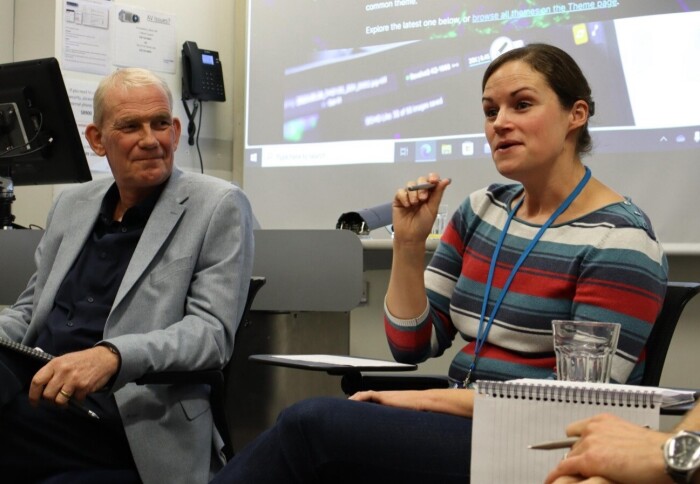Friday Forum: Reflections on animal research

Robert Floyd and Dr Victoria Male on the event panel
Three Imperial Science Communication Masters students reflect on what they learned at a recent forum on animal research.
As a part of Imperial’s ongoing Good Science Project, a recent Friday Forum event explored the past, present, and future of animal research at Imperial College London. Students Suah Lee, Lizzie Childers and Stephanie Okeyo, who are studying for MSc in Science Communication at Imperial, attended and they share their reflections below.
Animal use in research is a contentious topic. On the one hand, the animal model allows for rigorous biomedical research, paving the way for life-saving medicine and treatments for humans. On the other hand, ethical concerns are raised about the treatment of the animals and their potential suffering.
"Everything that we do evolves, and I think how we work will continue to evolve. I think that that's always going to be our goal." Robert Floyd Director of Central Biomedical Services
At the recent Friday Forum that we attended, the panel and audience explored the 3Rs – a framework for replacing the use of animals when possible, reducing the number of animals used for science while remaining scientifically robust, and refining how animals are treated to minimise any suffering.
The discussion, chaired by Dr Bryn Owen, Senior Lecturer in Endocrinology at Imperial and chairperson of the 3Rs advisory group, was designed to encourage probing questions from the audience. The panel was made of Mr. Robert Floyd, Director of the Central Biomedical Services (CBS) at Imperial, Mr. John Meredith, Head of Education and Outreach at the charity Understanding Animal Research, Dr Victoria Male, Senior Lecturer in Reproductive Immunology at Imperial, and Dr Richard van Arkel, Senior Lecturer in Mechanical Engineering at Imperial and the recipient of a NC3R grant.
Early on in the discussion, panelists said they felt that the public perception of the research has improved in recent years. “So everything that we do evolves, and I think how we work will continue to evolve. I think that that's always going to be our goal,” said Mr Floyd. Mr Meredith emphasised his belief that science needs a “renewed mandate from the public” for something that certainly constitutes an ethical challenge.
The audience heard that despite the better public perception of animal research, it is still clear that many people do not fully understand the importance and necessity of the work. Gaps remain in public knowledge regarding the importance and necessity of using animal models. The panel had different ideas as to why this gap exists, and how the societal acceptance of the animal model can be assured. Together, their suggestion was that enhancing transparency and providing detailed information about the regulatory landscape and the role of animal testing in research could help build public trust and understanding.
The panelists also emphasised the importance of working with MPs and policy experts, but noted that going down these avenues can be quite challenging. Various other ideas about how to engage the public were voiced, especially in relation to the young, who may not yet appreciate the uses of the animal model, and how this work is regulated. Mr Meredith suggested it would be valuable for A-level students to take class trips to animal laboratories. In this vein, the Imperial 3RHub has produced an e-learning course, which aims to educate students from GSCA up and researchers about the ethics involved in animal research. While the course is available for anyone to follow, Imperial is starting to incorporate it into undergraduate education, especially for medical students.
This Friday Forum discussion made clear that addressing the concerns surrounding animal testing requires effective communication, engaging society, and maintaining respect towards people with differing views. The panel felt that society would feel more favorable towards the use of animal models in research if they saw positive media coverage highlighting the significance of animal testing in medical research. Watching the discussion, we felt that awareness and concern about animal testing are enduring aspects of the ethics environment, and it is essential therefore that we enhance communication and education to illuminate the complexities surrounding this important issue. Through these efforts, we can encourage a more informed dialogue.
Article text (excluding photos or graphics) © Imperial College London.
Photos and graphics subject to third party copyright used with permission or © Imperial College London.
Reporter
Press Office
Communications and Public Affairs
- Email: press.office@imperial.ac.uk
